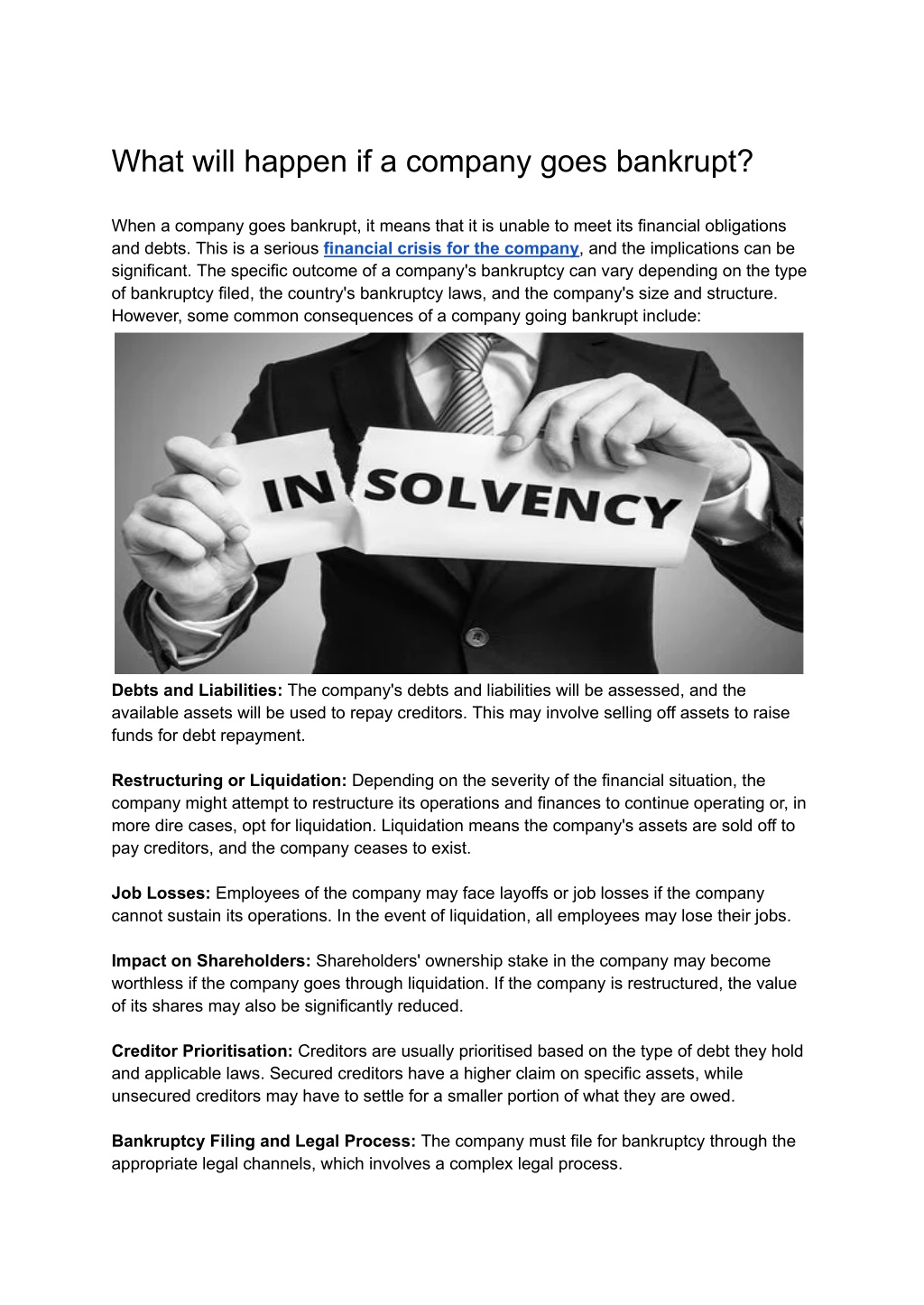Administration Staff and Their Rights: Do You Get Paid or Receive Redundancy When a Company Goes Into Administration?
Administration Staff and Their Rights: Do You Get Paid or Receive Redundancy When a Company Goes Into Administration?
Blog Article
Comprehending the Repercussions of Firm Liquidation on Worker Retention and Perks

Effect On Work Safety And Security
In the occasion of business liquidation, the influence on job security can be substantial for staff members as unpredictability relating to future work develops. When a firm goes into liquidation, employees encounter the daunting prospect of potential work loss. This unpredictability can cause heightened tension and anxiousness among the labor force, influencing their spirits and efficiency.
Throughout the liquidation process, employees might experience a variety of emotions, including concern, aggravation, and rage, as they face the possibility of joblessness. The absence of clearness surrounding the timeline of the liquidation and the destiny of their settings can develop a sense of instability within the workforce.
Additionally, staff members might likewise be concerned about the standing of their benefits, such as healthcare insurance coverage, retired life plans, and paid pause, throughout and after the liquidation procedure. The potential loss of these advantages adds one more layer of intricacy to an already difficult situation for employees.
Changes in Employee Benefits

One common adjustment is the decrease or removal of particular advantages to cut expenses and clear up exceptional financial obligations. Employer contributions to retired life strategies might discontinue, leaving staff members to bear the full duty of saving for their future. In addition, medical care advantages might be scaled back, leading to higher out-of-pocket expenditures for medical services.
Interaction becomes vital during this duration of change. Companies need to be clear about the adjustments, giving clear descriptions and assistance to aid staff members navigate with the adjustments. Open up discussion and assistance can assist relieve stress and anxiety and uncertainty amongst the workforce, promoting a much more favorable change experience regardless of the difficult conditions.
Retention Methods Post-Liquidation
Adhering to the firm liquidation, applying efficient retention strategies is important continue reading this to securing business ability and maintaining stability within the labor force. In times of uncertainty, workers may feel anxious about their future job safety and be much more inclined to seek alternate employment possibility. To mitigate this danger, companies need to concentrate on open communication, supplying transparency concerning the business's scenario, if a company goes into administration do i have to pay them and supplying support to staff members throughout the transition duration.
One secret retention approach post-liquidation is to focus on staff member well-being and morale. This can be achieved through normal check-ins, counseling solutions, and creating a positive job setting. In addition, providing occupation advancement chances and upskilling programs can boost staff member inspiration and interaction throughout difficult times. Acknowledging and compensating employees for their loyalty and commitment can likewise foster a feeling of commitment and devotion to the organization.
Furthermore, developing a clear job progression path and setting realistic objectives can give employees a feeling of direction and function within the firm (do employees get paid when company goes into liquidation). By investing in employee growth and actively including them in decision-making processes, companies can boost staff member retention rates and build a resistant workforce post-liquidation
Legal Civil Liberty and Protections
Throughout the consequences of firm liquidation, it is vital to resolve the lawful rights and protections available to staff members to ensure a reasonable and compliant procedure. Employees encountering work loss due to liquidation have particular civil liberties safeguarded by work laws. These civil liberties include privileges to overdue earnings, severance pay if suitable, and accumulated vacation or authorized leave payouts. It is critical for staff members to recognize these rights and seek lawful advice if required to navigate the intricacies of the liquidation procedure.
In addition, in cases where a business goes right into liquidation, staff members are frequently taken into consideration advantageous financial institutions, giving them higher click for source priority in getting exceptional settlements over other financial institutions. Recognizing these lawful rights and securities is essential for staff members to guard their rate of interests and seek ideal choice in the occasion of company liquidation - do employees get paid when company goes into liquidation.
Handling Financial Uncertainty
Navigating economic unpredictability can be a complicated obstacle for employees affected by business liquidation. During such times, it is vital for workers to analyze their existing monetary circumstance genuinely.
Looking for financial therapy or assistance from experts can offer beneficial insights right into managing financial debts, restructuring monetary responsibilities, and planning for the future. It is essential for employees to remain informed regarding their privileges, such as severance bundles or outstanding payments, to ensure they get what they are owed. Additionally, thinking about alternative employment alternatives or gig possibilities can aid bridge financial gaps throughout this transitional duration. By proactively attending to economic challenges, workers can browse with the unpredictability triggered by company liquidation with better resilience and preparedness.
Verdict
In conclusion, company liquidation can have substantial implications on worker job safety, advantages, and overall wellness. Understanding lawful rights and securities can aid reduce the impact of liquidation on staff members.
When a firm faces liquidation, the destiny of its workers hangs in the equilibrium, elevating critical questions about job security, advantages, and long-lasting security. The influence of firm liquidation on staff member retention and advantages is a multifaceted concern that requires a better evaluation to comprehend the complete range of its consequences.
Browsing economic unpredictability can be a challenging difficulty for employees affected by business liquidation. By proactively addressing monetary challenges, employees can browse through the uncertainty created by company liquidation with greater strength and readiness.

Report this page